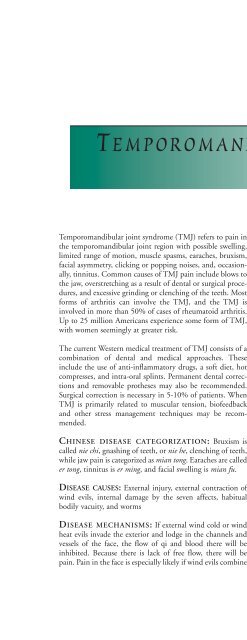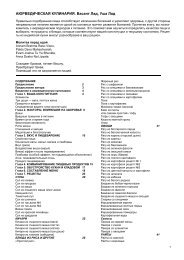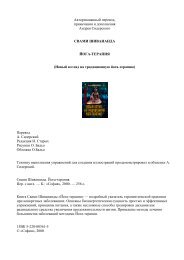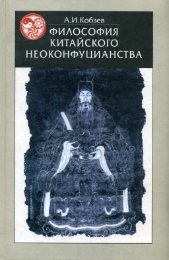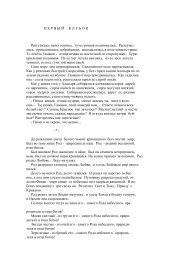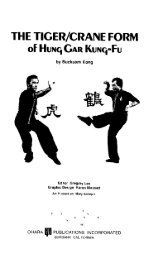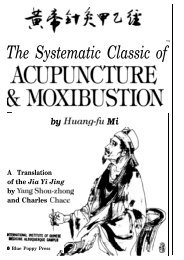- Page 4:
PRAISE FORTHE TREATMENT OF MODERN W
- Page 8:
This volume will serve not only as
- Page 12:
THE TREATMENT OFMODERN WESTERN MEDI
- Page 18:
Published by:BLUE POPPY PRESSA Divi
- Page 22:
xTHE TREATMENT OF MODERN WESTERN DI
- Page 28:
TABLE OF CONTENTS(ALPHABETICAL)Pref
- Page 32:
TABLE OF CONTENTS (ALPHABETICAL)xv5
- Page 36:
TABLE OF CONTENTS(BY MEDICAL SPECIA
- Page 40:
TABLE OF CONTENTS (BY MEDICAL SPECI
- Page 44:
INTRODUCTIONThis book is a clinical
- Page 48:
INTRODUCTION 3appearances from the
- Page 52:
INTRODUCTION 5or even international
- Page 56:
INTRODUCTION 7SAMPLECopyright © Bl
- Page 60:
INTRODUCTION 9Expel windCourse wind
- Page 64:
INTRODUCTION 11the first thing to d
- Page 68:
INTRODUCTION 13understands, the eas
- Page 72:
➤➤➤INTRODUCTION 15if qi stagn
- Page 76:
INTRODUCTION 17may damage yin fluid
- Page 80:
INTRODUCTION 19The lifegate is the
- Page 84:
INTRODUCTION 21tioned above, Qing d
- Page 88:
INTRODUCTION 23formula from the qi-
- Page 92:
INTRODUCTION 25towards yin vacuity
- Page 96:
INTRODUCTION 27HEART-GALLBLADDER QI
- Page 100:
INTRODUCTION 29ment and transformat
- Page 104:
INTRODUCTION 31mai is connected wit
- Page 108:
INTRODUCTION 33scribed].” 31 In o
- Page 112:
INTRODUCTION 35and acute diseases a
- Page 116:
INTRODUCTION 37Similarly, the durat
- Page 120:
1ACNE VULGARISAcne vulgaris or comm
- Page 124:
ACNE VULGARIS 41Scutellariae ), Chi
- Page 128:
ACNE VULGARIS 43Dang Shen (Radix Co
- Page 132:
ACNE VULGARIS 45(Fructus Forsythiae
- Page 136:
2ALLERGIC RHINITISAllergic rhinitis
- Page 140:
ALLERGIC RHINITIS 49Chang Pu (Rhizo
- Page 144:
ALLERGIC RHINITIS 51ANALYSIS OF FOR
- Page 150:
54 THE TREATMENT OF MODERN WESTERN
- Page 154:
56 THE TREATMENT OF MODERN WESTERN
- Page 158:
58 THE TREATMENT OF MODERN WESTERN
- Page 162:
60 THE TREATMENT OF MODERN WESTERN
- Page 166:
62 THE TREATMENT OF MODERN WESTERN
- Page 170:
64 THE TREATMENT OF MODERN WESTERN
- Page 176:
5ANKYLOSING SPONDYLITIS(AS)Ankylosi
- Page 180:
ANKYLOSING SPONDYLITIS (AS) 69Bai S
- Page 184:
ANKYLOSING SPONDYLITIS (AS) 71ANALY
- Page 190:
74 THE TREATMENT OF MODERN WESTERN
- Page 194:
76 THE TREATMENT OF MODERN WESTERN
- Page 198:
78 THE TREATMENT OF MODERN WESTERN
- Page 202:
80 THE TREATMENT OF MODERN WESTERN
- Page 206:
82 THE TREATMENT OF MODERN WESTERN
- Page 210:
84 THE TREATMENT OF MODERN WESTERN
- Page 216:
8BENIGN PROSTATICHYPERTROPHYAlso ca
- Page 220:
BENIGN PROSTATIC HYPERTROPHY (BPH)
- Page 224:
BENIGN PROSTATIC HYPERTROPHY (BPH)
- Page 228:
BENIGN PROSTATIC HYPERTROPHY (BPH)
- Page 232:
9BRONCHIAL ASTHMABronchial asthma i
- Page 236:
BRONCHIAL ASTHMA 97Carmichaeli ), 1
- Page 240:
BRONCHIAL ASTHMA 99lungs. Neverthel
- Page 244:
BRONCHIAL ASTHMA 101For enduring de
- Page 248:
BRONCHIAL ASTHMA 103RX: Liu Jun Zi
- Page 252:
BRONCHIAL ASTHMA 105mixed with deep
- Page 256:
10CARPAL TUNNEL SYNDROMECarpal tunn
- Page 260:
CARPAL TUNNEL SYNDROME (CTS) 109ANA
- Page 264:
11CELIAC DISEASECeliac disease, als
- Page 268:
CELIAC DISEASE 113Ge Gen (Radix Pue
- Page 274:
116 THE TREATMENT OF MODERN WESTERN
- Page 278:
118 THE TREATMENT OF MODERN WESTERN
- Page 284:
13CERVICAL SPONDYLOSISCervical spon
- Page 288:
CERVICAL SPONDYLOSIS 123(Rhizoma Li
- Page 292:
CERVICAL SPONDYLOSIS 125ANALYSIS OF
- Page 296:
CERVICAL SPONDYLOSIS 127(Rhizoma Ch
- Page 302:
130 THE TREATMENT OF MODERN WESTERN
- Page 306:
132 THE TREATMENT OF MODERN WESTERN
- Page 310:
134 THE TREATMENT OF MODERN WESTERN
- Page 316:
15CHRONIC ACTIVE HEPATITISChronic a
- Page 320:
CHRONIC ACTIVE HEPATITIS (CAH) 139A
- Page 324:
CHRONIC ACTIVE HEPATITIS (CAH) 1415
- Page 328:
CHRONIC ACTIVE HEPATITIS (CAH) 143T
- Page 332:
CHRONIC ACTIVE HEPATITIS (CAH) 145A
- Page 336:
16CHRONIC FATIGUE IMMUNEDEFICIENCY
- Page 340:
CHRONIC FATIGUE IMMUNE DEFICIENCY S
- Page 344:
CHRONIC FATIGUE IMMUNE DEFICIENCY S
- Page 348:
17CHRONICGLOMERULONEPHRITISChronic
- Page 352:
CHRONIC GLOMERULONEPHRITIS 155ADDIT
- Page 356:
CHRONIC GLOMERULONEPHRITIS 157Yin J
- Page 360:
CHRONIC GLOMERULONEPHRITIS 159and F
- Page 364:
CHRONIC GLOMERULONEPHRITIS 161add W
- Page 368:
18CHRONIC PANCREATITISChronic pancr
- Page 372:
CHRONIC PANCREATITIS 165TREATMENT P
- Page 376:
CHRONIC PANCREATITIS 167limbs, subt
- Page 380:
19CHRONIC PROSTATITISChronic prosta
- Page 384:
CHRONIC PROSTATITIS 1712. QI STAGNA
- Page 388:
CHRONIC PROSTATITIS 173Tu Fu Ling (
- Page 392:
CHRONIC PROSTATITIS 1752. Although
- Page 396:
20CHRONIC RENAL FAILUREAlso called
- Page 400:
CHRONIC RENAL FAILURE (CRF) 179gram
- Page 404:
CHRONIC RENAL FAILURE (CRF) 181ACUP
- Page 408:
CHRONIC RENAL FAILURE (CRF) 183(Rhi
- Page 412:
21CHRONIC SINUSITISSinusitis is an
- Page 416:
CHRONIC SINUSITIS 187branes, severe
- Page 420:
CHRONIC SINUSITIS 189mix-fried Gan
- Page 424:
CHRONIC SINUSITIS 191each, Jie Geng
- Page 430:
194 THE TREATMENT OF MODERN WESTERN
- Page 434:
196 THE TREATMENT OF MODERN WESTERN
- Page 438:
198 THE TREATMENT OF MODERN WESTERN
- Page 442:
200 THE TREATMENT OF MODERN WESTERN
- Page 446:
202 THE TREATMENT OF MODERN WESTERN
- Page 452:
23COSTOCHONDRITISAlso called Tietze
- Page 456:
COSTOCHONDRITIS 207ENDNOTE:1Yang Ch
- Page 462:
210 THE TREATMENT OF MODERN WESTERN
- Page 468:
25CUSHING’S SYNDROMECushing’s s
- Page 472:
CUSHING’S SYNDROME 215each of Sua
- Page 476:
CUSHING’S SYNDROME 217sity, edema
- Page 480:
26DENGUE FEVERDengue fever, also ca
- Page 484:
DENGUE FEVER 221Hou Po (Cortex Magn
- Page 488:
DENGUE FEVER 223ish the blood and e
- Page 494:
226 THE TREATMENT OF MODERN WESTERN
- Page 498:
228 THE TREATMENT OF MODERN WESTERN
- Page 502:
230 THE TREATMENT OF MODERN WESTERN
- Page 506:
232 THE TREATMENT OF MODERN WESTERN
- Page 510:
234 THE TREATMENT OF MODERN WESTERN
- Page 514:
236 THE TREATMENT OF MODERN WESTERN
- Page 518:
238 THE TREATMENT OF MODERN WESTERN
- Page 524:
30FIBROMYALGIA SYNDROME(FMS)Fibromy
- Page 528:
FIBROMYALGIA SYNDROME (FMS) 243enge
- Page 532:
FIBROMYALGIA SYNDROME (FMS) 245TREA
- Page 536:
FIBROMYALGIA SYNDROME (FMS) 247ACUP
- Page 540:
FIBROMYALGIA SYNDROME (FMS) 2495. S
- Page 544:
FIBROMYALGIA SYNDROME (FMS) 251and
- Page 550:
254 THE TREATMENT OF MODERN WESTERN
- Page 554:
256 THE TREATMENT OF MODERN WESTERN
- Page 558:
258 THE TREATMENT OF MODERN WESTERN
- Page 564:
32HASHIMOTO’S THYROIDITISHashimot
- Page 568:
HASHIMOTO’S THYROIDITIS 263Rou Gu
- Page 572:
HASHIMOTO’S THYROIDITIS 265ANALYS
- Page 578:
268 THE TREATMENT OF MODERN WESTERN
- Page 582:
270 THE TREATMENT OF MODERN WESTERN
- Page 588:
34HERPES GENITALIAHerpes genitalia
- Page 592:
HERPES GENITALIA 275NOTE: This patt
- Page 596:
HERPES GENITALIA 277Ku Shen (Radix
- Page 600:
35HERPES ZOSTERHerpes zoster refers
- Page 604:
HERPES ZOSTER 281and Yi Mu Cao toge
- Page 608:
36HYPERLIPOPROTEINEMIAHyperlipoprot
- Page 612:
HYPERLIPOPROTEINEMIA 285vexatious h
- Page 616:
HYPERLIPOPROTEINEMIA 287govern the
- Page 620:
HYPERLIPOPROTEINEMIA 289Qi (Radix A
- Page 624:
37HYPERTENSIONHypertension refers t
- Page 628:
HYPERTENSION 293this disorder. Yin
- Page 632:
HYPERTENSION 295numbness of the lim
- Page 636:
HYPERTENSION 297RX: Xue Fu Zhu Yu T
- Page 640:
HYPERTENSION 299INGREDIENTS:Gui Ban
- Page 644:
38HYPERTHYROIDISMHyperthyroidism is
- Page 648:
HYPERTHYROIDISM 303tability, easy a
- Page 652:
HYPERTHYROIDISM 305ANALYSIS OF FORM
- Page 656:
39HYPOGLYCEMIAHypoglycemia refers t
- Page 660:
HYPOGLYCEMIA 3092. QI VACUITY & PHL
- Page 664:
HYPOGLYCEMIA 311and relaxation as w
- Page 670:
314 THE TREATMENT OF MODERN WESTERN
- Page 674:
316 THE TREATMENT OF MODERN WESTERN
- Page 680:
41IDIOPATHIC THROMBOCYTOPENICPURPUR
- Page 684:
IDIOPATHIC THROMBOCYTOPENIC PURPURA
- Page 688:
IDIOPATHIC THROMBOCYTOPENIC PURPURA
- Page 692:
42INTERSTITIAL CYSTITISInterstitial
- Page 696:
INTERSTITIAL CYSTITIS (IC) 327INGRE
- Page 700:
INTERSTITIAL CYSTITIS (IC) 329ACUPU
- Page 704:
INTERSTITIAL CYSTITIS (IC) 331regul
- Page 710:
334 THE TREATMENT OF MODERN WESTERN
- Page 714:
336 THE TREATMENT OF MODERN WESTERN
- Page 718:
338 THE TREATMENT OF MODERN WESTERN
- Page 724:
45LUMBAR DISK HERNIATIONLumbar disk
- Page 728:
LUMBAR DISK HERNIATION 343RX: Du Hu
- Page 732:
LUMBAR DISK HERNIATION 345Lu Jiao J
- Page 736:
LUMBAR DISK HERNIATION 347one must
- Page 742:
350 THE TREATMENT OF MODERN WESTERN
- Page 746:
352 THE TREATMENT OF MODERN WESTERN
- Page 750:
354 THE TREATMENT OF MODERN WESTERN
- Page 754:
356 THE TREATMENT OF MODERN WESTERN
- Page 760:
48MENIERE’S DISEASEMeniere’s di
- Page 764:
MENIERE’S DISEASE 361ADDITIONS &
- Page 768:
MENIERE’S DISEASE 363add Ting Gon
- Page 772:
49MIGRAINE HEADACHESMigraines are a
- Page 776:
MIGRAINE HEADACHES 367If the flow o
- Page 780:
MIGRAINE HEADACHES 369Chrysanthemum
- Page 784:
MIGRAINE HEADACHES 371ADDITIONS & S
- Page 788:
50MULTIPLE SCLEROSISMultiple sclero
- Page 792:
MULTIPLE SCLEROSIS (MS) 375draining
- Page 796:
MULTIPLE SCLEROSIS (MS) 377yin. Lu
- Page 800:
MULTIPLE SCLEROSIS (MS) 3793. Altho
- Page 806:
382 THE TREATMENT OF MODERN WESTERN
- Page 810:
384 THE TREATMENT OF MODERN WESTERN
- Page 814:
386 THE TREATMENT OF MODERN WESTERN
- Page 818:
388 THE TREATMENT OF MODERN WESTERN
- Page 822:
390 THE TREATMENT OF MODERN WESTERN
- Page 826:
392 THE TREATMENT OF MODERN WESTERN
- Page 830:
394 THE TREATMENT OF MODERN WESTERN
- Page 834:
396 THE TREATMENT OF MODERN WESTERN
- Page 838:
398 THE TREATMENT OF MODERN WESTERN
- Page 844:
54OSTEOPOROSISOsteoporosis is a gen
- Page 848:
OSTEOPOROSIS 403abundant, the marro
- Page 852:
OSTEOPOROSIS 405Yang Huo (Herba Epi
- Page 858:
408 THE TREATMENT OF MODERN WESTERN
- Page 862:
410 THE TREATMENT OF MODERN WESTERN
- Page 866:
412 THE TREATMENT OF MODERN WESTERN
- Page 870:
414 THE TREATMENT OF MODERN WESTERN
- Page 874:
416 THE TREATMENT OF MODERN WESTERN
- Page 878:
418 THE TREATMENT OF MODERN WESTERN
- Page 882:
420 THE TREATMENT OF MODERN WESTERN
- Page 886:
422 THE TREATMENT OF MODERN WESTERN
- Page 890:
424 THE TREATMENT OF MODERN WESTERN
- Page 894:
426 THE TREATMENT OF MODERN WESTERN
- Page 900:
58PERIODONTAL DISEASEPeriodontal di
- Page 904:
PERIODONTAL DISEASE 431six grams of
- Page 908:
PERIODONTAL DISEASE 433and stops bl
- Page 912:
59PERIPHERAL NEUROPATHYPeripheral n
- Page 916:
PERIPHERAL NEUROPATHY (PN) 437ANALY
- Page 920:
PERIPHERAL NEUROPATHY (PN) 439ANALY
- Page 926:
442 THE TREATMENT OF MODERN WESTERN
- Page 930:
444 THE TREATMENT OF MODERN WESTERN
- Page 934:
446 THE TREATMENT OF MODERN WESTERN
- Page 938:
448 THE TREATMENT OF MODERN WESTERN
- Page 942:
450 THE TREATMENT OF MODERN WESTERN
- Page 946:
452 THE TREATMENT OF MODERN WESTERN
- Page 950:
454 THE TREATMENT OF MODERN WESTERN
- Page 956:
63POSTCONCUSSION SYNDROMEPostconcus
- Page 960:
POSTCONCUSSION SYNDROME 459Hui, and
- Page 964:
POSTCONCUSSION SYNDROME 461Fu Ling
- Page 968:
64PSORIATIC ARTHRITISPsoriatic arth
- Page 972:
PSORIATIC ARTHRITIS 465ANALYSIS OF
- Page 978:
468 THE TREATMENT OF MODERN WESTERN
- Page 982:
470 THE TREATMENT OF MODERN WESTERN
- Page 986:
472 THE TREATMENT OF MODERN WESTERN
- Page 990:
474 THE TREATMENT OF MODERN WESTERN
- Page 994:
476 THE TREATMENT OF MODERN WESTERN
- Page 998:
478 THE TREATMENT OF MODERN WESTERN
- Page 1002:
480 THE TREATMENT OF MODERN WESTERN
- Page 1006:
482 THE TREATMENT OF MODERN WESTERN
- Page 1012:
68RHEUMATOID ARTHRITISRheumatoid ar
- Page 1016:
RHEUMATOID ARTHRITIS (RA) 487ADDITI
- Page 1020:
RHEUMATOID ARTHRITIS (RA) 489ADDITI
- Page 1024:
69ROMBERG’S SYNDROMERomberg’s o
- Page 1028:
70SCLERODERMAAlso referred to as pr
- Page 1032:
SCLERODERMA 495(Radix Achyranthis B
- Page 1036:
SCLERODERMA 497Pao Jiang (blast-fri
- Page 1040:
71SJÖGREN’S SYNDROMESjögren’s
- Page 1044:
SJÖGREN’S SYNDROME (SS) 501dry m
- Page 1048: SJÖGREN’S SYNDROME (SS) 5036. QI
- Page 1052: 72STILL’S DISEASEStill’s diseas
- Page 1056: STILL’S DISEASE 507by over-workin
- Page 1062: 510 THE TREATMENT OF MODERN WESTERN
- Page 1066: 512 THE TREATMENT OF MODERN WESTERN
- Page 1070: 514 THE TREATMENT OF MODERN WESTERN
- Page 1076: 75SYSTEMIC LUPUSERYTHMATOSUSAlso kn
- Page 1080: SYSTEMIC LUPUS ERYTHMATOSUS (SLE) 5
- Page 1084: SYSTEMIC LUPUS ERYTHMATOSUS (SLE) 5
- Page 1088: SYSTEMIC LUPUS ERYTHMATOSUS (SLE) 5
- Page 1092: SYSTEMIC LUPUS ERYTHMATOSUS (SLE) 5
- Page 1096: SYSTEMIC LUPUS ERYTHMATOSUS (SLE) 5
- Page 1104: TEMPOROMANDIBULAR JOINT SYNDROME (T
- Page 1108: TEMPOROMANDIBULAR JOINT SYNDROME (T
- Page 1112: TEMPOROMANDIBULAR JOINT SYNDROME (T
- Page 1116: TEMPOROMANDIBULAR JOINT SYNDROME (T
- Page 1122: 540 THE TREATMENT OF MODERN WESTERN
- Page 1126: 542 THE TREATMENT OF MODERN WESTERN
- Page 1130: 544 THE TREATMENT OF MODERN WESTERN
- Page 1134: 546 THE TREATMENT OF MODERN WESTERN
- Page 1138: 548 THE TREATMENT OF MODERN WESTERN
- Page 1142: 550 THE TREATMENT OF MODERN WESTERN
- Page 1146: 552 THE TREATMENT OF MODERN WESTERN
- Page 1150:
554 THE TREATMENT OF MODERN WESTERN
- Page 1154:
556 THE TREATMENT OF MODERN WESTERN
- Page 1158:
558 THE TREATMENT OF MODERN WESTERN
- Page 1162:
560 THE TREATMENT OF MODERN WESTERN
- Page 1168:
BIBLIOGRAPHYCHINESE LANGUAGE BIBLIO
- Page 1172:
CHINESE LANGUAGE BIBLIOGRAPHY 565Ne
- Page 1176:
CHINESE LANGUAGE BIBLIOGRAPHY 567
- Page 1180:
ENGLISH LANGUAGE BIBLIOGRAPHY 569Zh
- Page 1184:
ENGLISH LANGUAGE BIBLIOGRAPHY 571En
- Page 1188:
FRENCH LANGUAGE BIBLIOGRAPHY 573FRE
- Page 1194:
576 THE TREATMENT OF MODERN WESTERN
- Page 1198:
578 THE TREATMENT OF MODERN WESTERN
- Page 1202:
580 THE TREATMENT OF MODERN WESTERN
- Page 1206:
582 THE TREATMENT OF MODERN WESTERN
- Page 1210:
584 THE TREATMENT OF MODERN WESTERN
- Page 1214:
586 THE TREATMENT OF MODERN WESTERN
- Page 1218:
588 THE TREATMENT OF MODERN WESTERN
- Page 1222:
590 THE TREATMENT OF MODERN WESTERN
- Page 1226:
592 THE TREATMENT OF MODERN WESTERN
- Page 1230:
594 THE TREATMENT OF MODERN WESTERN
- Page 1234:
596 THE TREATMENT OF MODERN WESTERN
- Page 1238:
CURING DEPRESSION NATURALLY WITHCHI
- Page 1242:
THE SYSTEMATIC CLASSIC OFACUPUNCTUR


